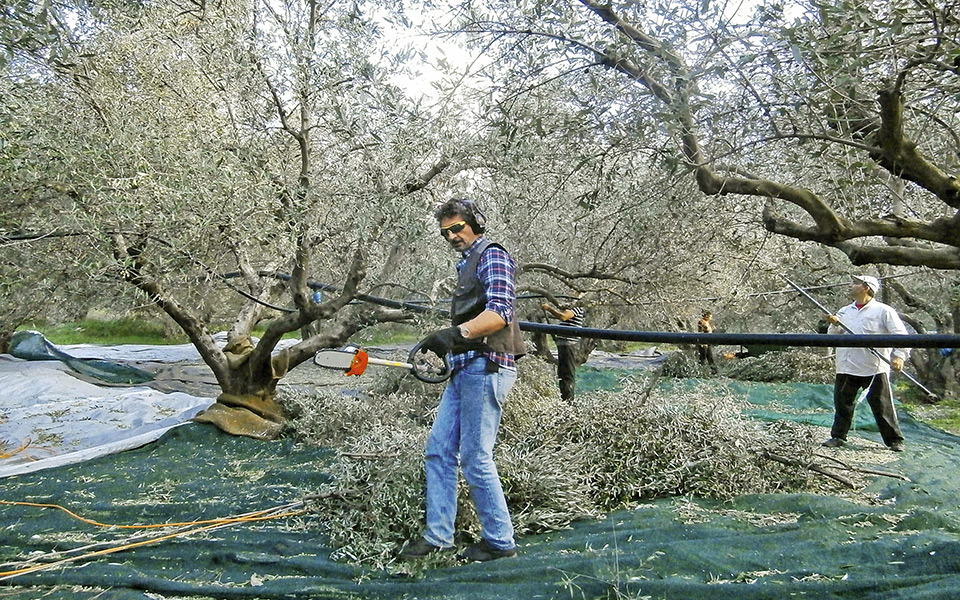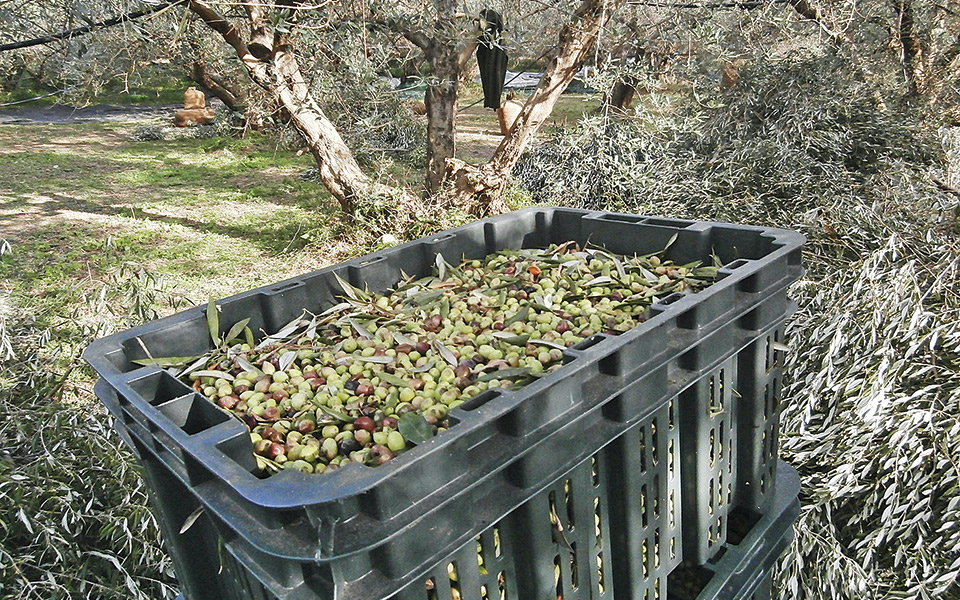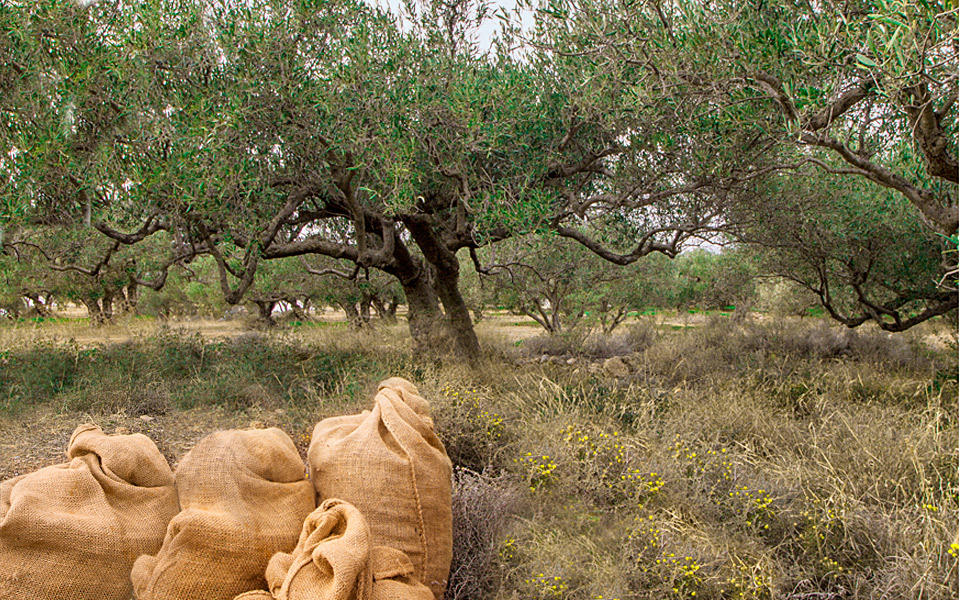For 15 years, Kyriakos Makratzis traveled the world as a ship captain. Speaking with me under his olive trees in the midst of last November’s harvest, however, he summarized those years of adventure in a few sentences and instead focused on what happened after his first son was born and he gave up seafaring and his respected maritime position to return to his family farm in Kontomari, Crete. Planting 2,000 Koroneiki olive trees between his father’s orange trees and his grandfather’s grapevines, Kyriakos gradually transformed much of the farm into an olive grove. Today, it is the olives that are transformed; the Cretan company Terra Creta uses them to help create some of their internationally award-winning extra virgin olive oils. The captain’s harvest roams the world in treasured bottles while he remains rooted in the land of his forefathers.
Makratzis knows this land well. After school and during summers throughout his childhood, he helped his father farm the land and tend his cattle and goats. When he finished school, he escaped to the sea, just as his father had before him. He’d heard his father’s stories of his time as an engineer in the Greek Navy during World War II and his later work in the merchant marines, and Kyriakos wanted to follow in those footsteps, but with one difference; from the start, he had set his sights on becoming a captain, so he wouldn’t have to get his hands dirty every day – at least not onboard.
He did get them dirty on shore leave; he returned to help with the harvest every year. Rather than spending the summers on scenic Cretan beaches, he took his annual leave in the autumn in order to help harvest the olives that seemed to call to him from across the seas. “Every year, this time of year, I came back and I kept it alive,” he said.
“‘I’m very proud of what I’m doing. I was a captain, and every year I left the vessel to come here and collect my olives.’ He did this even though all the oil he produced wasn’t worth more than a month’s salary at sea.”

“Dedicated to producing the best possible product, Makratzis is one of a new team of farmers who, with the help of a scientific advisor affiliated with the nearby olive oil bottling and export company, Terra Creta, works exclusively with early harvest olives. ”
When he first returned to the land, Makratzis used to work his farm with just one helper; later, his son Lefteris, now a university student, joined him on occasion. In recent years, he has hired migrant laborers to help with the harvest. He showed me what they worked with: top-of-the-line portable electric harvesters that look like extra long, extra thick aluminum broomsticks with black carbon rods at the end. These tools dislodge the olives gently, knocking them down into the green netting without damaging either the trees or the fruit. The olives are then transferred to ventilated plastic boxes preferable to the traditional burlap bags because the crates protect the olives from being crushed or getting too hot on the way to the mill; cooler olives yield higher quality oil.
Dedicated to producing the best possible product, Makratzis is one of a new team of farmers who, with the help of a scientific advisor affiliated with the nearby olive oil bottling and export company, Terra Creta, works exclusively with early harvest olives. Their goal is to use new techniques to improve on traditional methods so as to produce larger quantities of high-quality, extra healthy early harvest olive oil.
During the harvest, Makratzis prunes the highest branches of his trees; the olives couldn’t be reached otherwise. From the severed branches, the olives are removed with a machine that, seen from the side, looks a bit like a barbecue grill. Every afternoon, all the olives harvested that day are taken to Terra Creta’s mill to be pressed, since prompt pressing is essential for the best quality oil.
This is not an easy life. During harvest-time, Makratzis gets up at 5:30 in the morning and is with his crew by 7:30. Because seasonal workers move around so much, some leaving the region or even the island in search of work, Makratzis needs to hire and train new teams every year to get them ready for the challenges they face. Nets get holes in them, and machines always need new parts. Mice bite into irrigation hoses while searching for water, creating leaks that have to be patched. When rain catches his crew by surprise, they have to dash around to cover the machines and remove all the harvested olives. It’s hard work. And while Makratzis planted his olive trees to bring in more money than oranges or grapes, olives don’t make Greek farmers rich, either.

Few people appreciate farming or village life in Greece these days, Makratzis told me. Young people head off to the cities of Greece, Europe or the USA, looking for easier lives. They think of farming as lowly employment. But Makratzis insisted, “I’m very proud of what I’m doing. I was a captain, and every year I left the vessel to come here and collect my olives.” He did this even though all the oil he produced wasn’t worth more than a month’s salary at sea.
“Sometimes I thought I was crazy. It’s not the money; I didn’t need the money.” So why did he do it? Although it takes a great deal of effort, he wanted to collect his olives because, as he said, “The oil is mine.” It’s something, he explained, that he himself had produced. That means something to him. “I won’t be like a homeless person who dies in a big city without food. I don’t even need to go to the market. I can pick my olives, my lemons, onions and tomatoes, so I can survive,” he stated with pride.
Makratzis believes most people don’t fully understand this kind of pride, or this sense of belonging. “You must make a round trip of your life to understand,” he said. “I visited the whole world – Borneo, New Zealand, Alaska, Vancouver, Indonesia, Japan, Russia – everywhere. Yet I feel like I never left.” He considers Crete: “the best place in the world.” That day last year, he spoke of its mild fall and winter and of the perfect climate and soil for some of the world’s best produce. The soil is generous; he earns a living as a farmer, although, as he pointed out to me, “The weather is the captain here,” so he’s never sure exactly how much his farm will produce. Nonetheless, he is certain it will be enough. His words to me as I left him under the shade of his trees? “The earth can give me everything.”
“His words to me as I left him under the shade of his trees? ‘The earth can give me everything.’”











